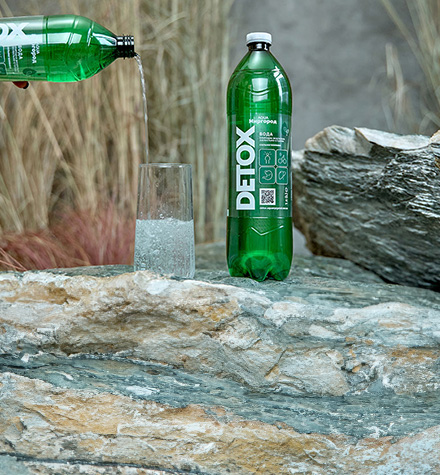Analysis of research on the medical properties of mineral water, identification of real benefits and analysis of common myths

Mineral waters have long been considered a valuable natural resource that has the ability to improve health and the general condition of the body. They play an important role in medical practice, especially in Ukraine, where natural sources of mineral waters are numerous. They are used for the treatment of various diseases, in particular those related to the digestive system, liver, gall bladder, as well as for the general improvement of the body.
Mineral waters are natural underground waters that contain various dissolved minerals and gases. They are classified according to several parameters, such as mineral content and chemical composition. Mineral water can be both natural and artificially enriched and is divided into several types, depending on the content of salts and other substances.
The most common types of mineral waters are:
1. Weakly mineralized waters: contain up to 2 g/l of dissolved salts.
2. Medium mineralized waters: contain 2–10 g/l of salts.
3. Highly mineralized waters: contain more than 10 g/l of salts.
Depending on the composition, mineral waters can be alkaline, sulfate, chloride, iron, and others. For example, alkaline mineral waters are known for their soothing effect on the gastrointestinal tract and are used to treat gastritis and peptic ulcers.
Benefits of mineral water:
1. Hydration: mineral water helps maintain an optimal level of body hydration. It can be especially useful for athletes and people who do physical work.
2. Enrichment of the body with minerals: the use of mineral water helps replenish the reserves of minerals necessary for the bone system, muscles and general metabolism.
3. Improving digestion: alkaline mineral waters contribute to the normalization of the acid-alkaline balance in the body, which can improve digestion and reduce the risk of gastrointestinal tract diseases.
Medicinal water and its properties
Healing mineral waters differ in their specific composition, which can be useful for the treatment of certain diseases.
Healing properties of mineral water:
1. Antioxidant effect: many types of mineral water contain antioxidants that help fight free radicals, which helps reduce the risk of cancer.
2. Detoxification: water helps to remove toxins from the body, which has a positive effect on the general state of health.
3. Improves skin condition: regular use of mineral water helps to hydrate the skin and reduce the appearance of problems such as acne and dryness.
Alkaline mineral waters: benefits and myths
Alkaline mineral waters have gained popularity as a means of improving general health and prevention of a number of diseases:
1. Improving the work of the gastrointestinal tract: mineral waters stimulate the secretion of gastric juice, improve digestion and assimilation of nutrients.
2. Liver and Gallbladder Cleansing: certain types of mineral waters are known to have the ability to stimulate bile secretion, which is beneficial in the treatment of liver and gallbladder disorders.
3. Cleansing the body: therapeutic mineral waters help remove toxins and toxins from the body, supporting the functioning of the kidneys and liver.
4. Strengthening bones and joints: waters containing calcium and magnesium help strengthen bone tissue, improve the condition of joints and prevent osteoporosis.
5. Calming effect: alkaline mineral waters can reduce stomach acidity and have a calming effect on the nervous system
However, there are many myths that lead to misconceptions about the healing properties of water:
1. Miraculous properties: many believe that alkaline water can cure all diseases. However, scientific studies do not support this myth. Alkaline water can be beneficial as part of a healthy lifestyle, but it is not a panacea.
2. Weight loss: Although some claim that alkaline water helps with weight loss, there is not enough scientific evidence to support this fact. Weight loss is achieved through a comprehensive approach that includes proper nutrition and physical activity.
3. Mineral water as a cure-all: Although mineral water has many beneficial properties, it is not a cure-all. Its use should be part of a healthy lifestyle.
4. High mineral content is always good: too much mineral intake can be harmful. For example, too much sodium can lead to high blood pressure. It is important to consult a doctor about the optimal use of mineral water.
5. Carbonated mineral water is more useful than still. The benefits of carbonated mineral water are overestimated, as carbon dioxide can irritate the stomach lining and cause discomfort.
6. Healing mineral water is suitable for everyone. Mineral waters have different chemical compositions, and what is suitable for one patient may be harmful for another. For example, mineral water for the treatment of the gall bladder may contain components that are contraindicated in certain diseases of the heart or kidneys.
Mineral waters have a significant potential to improve health due to their unique composition. They can be useful for hydration, enriching the body with minerals and improving digestion.
Healing mineral waters are used in complex therapy of liver and gall bladder diseases. They contribute to the improvement of bile secretion, reduce bile stagnation and help restore liver functions. For example, gall bladder mineral water with a high sulfate content stimulates bile secretion and prevents the formation of gallstones.
However, it is important to remember that before starting treatment with mineral waters, you should definitely consult a doctor, who will determine the optimal composition and dosage of water according to the individual needs of the body.
Detox natural mineral water has a balanced composition of trace elements that contribute to the general cleansing of the body, improving digestion and increasing energy levels. It helps eliminate toxins by supporting kidney, liver and gallbladder function, making it a great choice for those looking to improve their health naturally.












